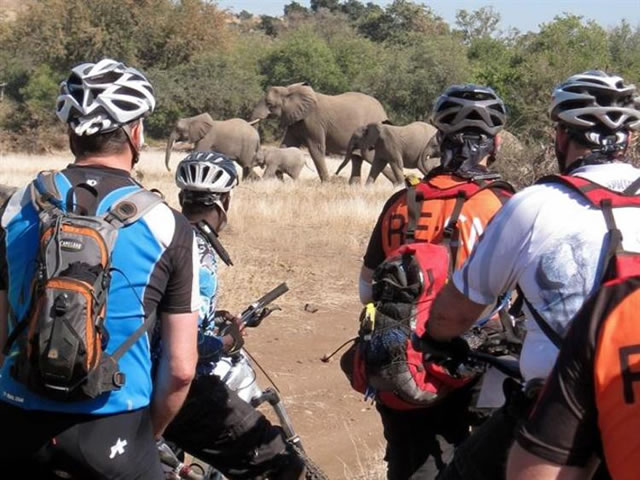Tour de Tuli: Is Zimbabwe getting raw deal?


The cycling expedition, which involves mainly mountain bike tours, attracts an average of 350 tourists from across the globe
Thupeyo Muleya
In the southern part of Zimbabwe meander two rivers, the Limpopo and Shashe.
These two rivers separate the country from its neighbours South Africa and Botswana respectively.Wildlife and natural features of different sizes and shapes are dotted on the course of these rivers right into the Indian Ocean.
Some of these features have become important tourist attractions for the region.
Along the courses of these two rivers is the Greater Mapungubwe Transfrontier Conservation Area, which is made up of national parks of Zimbabwe, Botswana and South Africa.
The transfrontier park was established as part of regional efforts to increase the traffic of tourism to that part of Southern Africa by consolidating marketing, infrastructure development and investment promotion in the conservation areas.
It is in that spirit that Zimbabwe, Botswana and South Africa agreed to hold the annual Tour de Tuli cycling expedition, which seeks to market the TFCA as one of the best tourist resorts in the Sadc region.
It was hoped that the cycling event would see the development of infrastructure and tourism facilities and boost the economic development of communities living within the TFCA.
Every August, tourists from around the world spend a day in Botswana, two nights in Zimbabwe and one night on the South African component.
However, Zimbabwe seems to be getting a raw deal in this kind of arrangement where proceeds from the tour are collected by a South African company.
The company says the money raised from the tour is channelled towards the sustainability of the Children in the Wilderness programme by hosting more children’s camps, eco-clubs and hosting quality staff training. But the benefits have not been seen.
Beitbridge West Member of Parliament Cde Metrine Mudau said the benefits of the tour to the community were not noticeable.
“We haven’t seen much of the benefits realised from the tour on the ground. We are waiting for the company to start some serious developmental work in the area as part of the initial agreement.
“There are a number of capital projects in the area which the organisers should consider funding such as construction of a primary school in Shashe number 14. This project has been progressing at a snail’s pace due to lack of funding.
“Other potential projects include drilling of boreholes and the construction of health care centres,” she said.
Children in the Wilderness (CIW), a South African company, has been playing a leading role in co-ordinating the event since the start of the tour four years ago.
Established in 2006, the Greater Mapungubwe Transfrontier Conservation Area, formerly known as the Limpopo-Shashe Transfrontier Conservation Area, is a mega park covering Northern Tuli Game Reserve (Botswana), Tuli National Park and Maramani Communal lands (Zimbabwe) and the Mapungubwe National Park (South Africa).
The cycling expedition, which involves mainly mountain bike tours, attracts an average of 350 tourists from across the globe and an additional 150 support staff handling issues of accommodation and other services.
To take part in the tour, cyclists pay R40 000 to the Children in the Wilderness.
The company also gets sponsorship from South African companies in terms of uniforms, bikes and other services.
Experience has shown that the tourists enjoy staying more on the Zimbabwean side of the park because of its rich flora and fauna.
That part of the park also has dinosaur fossils at the Sentinel area as well as a rich cultural community that resides in the Maramani area.
Given that 350 cyclists pay R40 000 each to partake in the tour, it therefore means that CITW is pocketing about R14 million (US$1, 4million) per annum from the tour.
“Out of the $1,4 million that CITW realises in revenue, Zimbabwe has since the inception of the event received a paltry US$3 500, equivalent to what one cyclist pays to participate in the tour, which CITW donated along with 500 lap desks and a few soccer balls to Beitbridge and Gwanda rural district councils respectively.
“Therefore, one wonders where the rest of the revenue is going. Zimbabwe should be an equal partner in this expedition, realising equal revenue as South Africa and Botswana.
“On the contrary, Zimbabwe seems to be used as a facade for the benefit of South African companies,” she added.
Development analysts say it is unfair that the company which provides catering services during the tour is South African and that outsources its supplies from the same country.
“That means that Zimbabwean suppliers are getting a raw deal even though tourists stay longer in this country.
As if that is not enough, key staff members are South African nationals whilst Zimbabweans are engaged mainly in menial jobs.
Beitbridge Rural District Council’s Campfire officer Mr Peter Ncube said the local authority was charging the tourists $10 per head in camping fees.
“Previously, the tourists would spend up to two nights in our area and we would realise approximately $7 000 in terms of revenue. We have used part of the money to set up a camping site in Maramani communal lands.
“It is worrying that Children in the Wilderness have this year deviated from the norm by changing camping sites to Nottingham Estate, a private conservancy where we will not realise any revenue.
“Furthermore, the company has not come out clear with regards to the sharing of proceeds from the tour among the local authorities from the three countries where the event takes place.
“Even promises to sponsor Eco clubs in Maramani communal lands have not materialised,” he said.
Mr Ncube said it was imperative that the organisers of the tour should consider outsourcing some of the services to local people as a means of spreading the benefits.
But National Parks and Wildlife Management Authority spokesperson Caroline Washaya-Moyo says: “One of the benefits that accrue to us in hosting the Tour de Tuli-Mapungubwe cycling event is the massive global tourism marketing and publicity mileage that we get free of charge.
“The Tour de Tuli-Mapungubwe organisers stage this event as a way of mobilising resources for their charity activities. CITW organises camping for children from local schools near or around protected or conservation areas to go on an outing at safari camps for about two weeks.
“At such camps, school children are taught conservation education and exposed to some of the life skills and opportunities offered in natural resources management and conservation.
“In 2010, 24 children were hosted at the Wilderness Safaris Camp in Hwange National Park where they spent about two weeks being hosted under the auspices of CITW”.
She added National Parks Authority, the Zimbabwe Tourism Authority and other partners, were finalising the development of a cross-border tourism product, which will also include the Maramani Camp.
“The organisers also support local community projects such as schools and there are efforts to establish some eco-clubs through collaboration with local schools,” she said.
But the benefits are negligible.
Contacted for comment, Tourism Minister Engineer Walter Mzembi referred The Herald to the Zimbabwe Tourism Authority but efforts to speak to the authority were fruitless.
It remains to be seen how long it will take for Zimbabwean authorities at the Tri-lateral Technical Committee to review the MoU among the three countries to ensure that they all derive maximum benefits from the TFCA.
Feedback: [email protected]








Comments